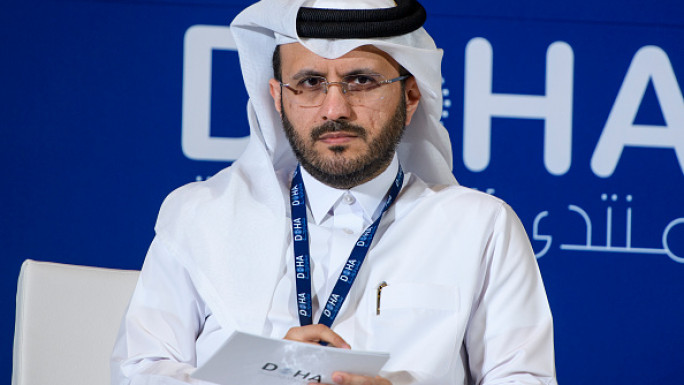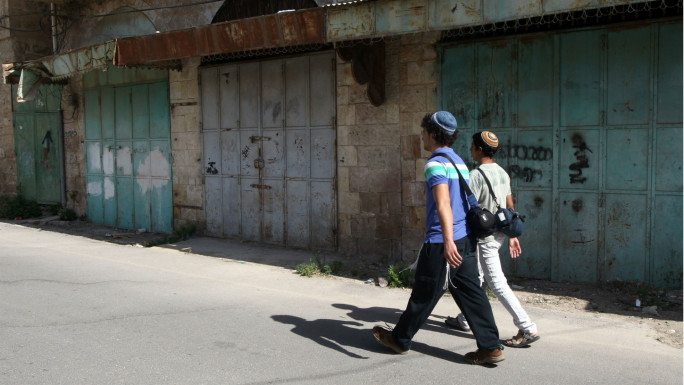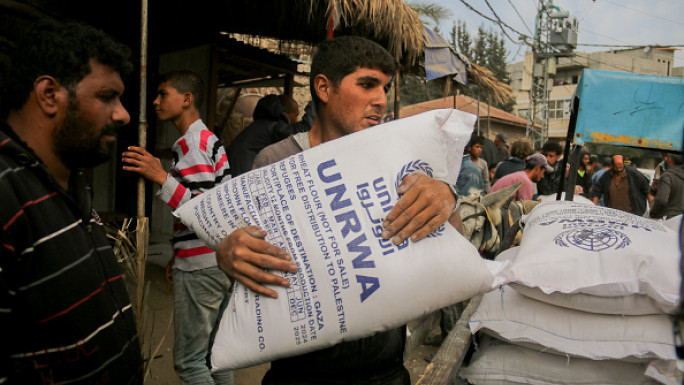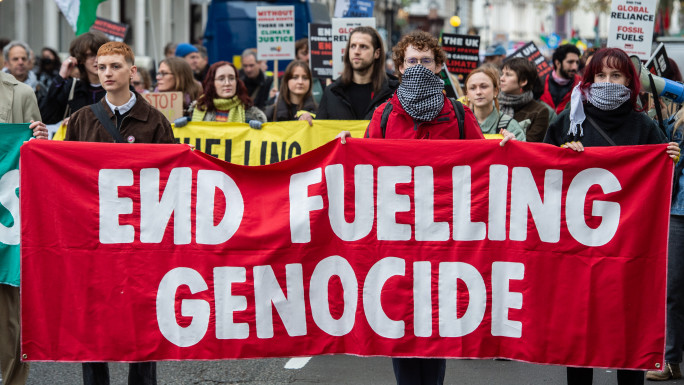
Coming, ready or not: an independent Kurdistan
"I cannot say if it will be next year, but I can say with certainty an independent Kurdistan is coming," said Masoud Barzani, the president of Iraq's Kurdish enclave, at an Atlantic Council Event in Washington on Wednesday.
In doing so he dispelled any doubt about the likelihood of an independent Kurdistan emerging in the near future.
During the packed event, Barzani made it clear he had discussed Kurdish independence and other regional and security issues with US president Barack Obama on Tuesday 5 May, and US vice president Joe Biden - a longtime champion of Kurdish independence - on Wednesday.
Although this is Barzani's fourth visit to Washington this time it looks and feels like a state visit of the highest calibre. This has given Kurdish independence an aura of inevitability, especially as Washington has increasingly come to rely on the Iraqi Kurdish Peshmerga forces in the fight against the Islamic State group, and is coordinating with them over the liberation of Mosul.
| Nearly all of Iraq's Kurds would give a resounding yes if asked if they wanted to be independent. |
Fouad Hussein, Barzani's chief of staff, played down the "independence significance" of the visit, saying: "The issue is not new. The president has written to Barack Obama before about regional security issues and the issue of Kurdish independence."
According to a high level member of Barzani's delegation who was visiting Washington, Barzani, whose term expired a couple of years ago, reportedly argued for Kurdish independence with Kurdish political parties in their last local meeting. They all but worked out a means to conduct a referendum in Kurdistan in the near future.
Barzani knows nearly all of Iraq's six million Kurds would give a resounding yes if asked if they wanted to be independent from Iraq. Even though no one knows exactly where the borders of the new state would run, given all the disputed areas.
When he was asked on Wednesday about the referendum on the issue promised last year, Barzani said that priorities had shifted for now after the rise of IS and the fall of Mosul.
The issue of Kurdish independence is complicated. It involves powerful neighbours like Turkey and Iran with their sizeable Kurdish populations. There are also Syria's Kurds who are embroiled in a horrifically violent, sectarian war with a multitude of forces. They have been operating semi-independently for sometime from Damascus.
The US, Europe and much of the world, have come to view the autonomous Kurdish region of Iraq as an independent country in all but name. They see it as relatively stable and prosperous in an otherwise volatile region, that has for been self-governing for over 20 years and has an independent economy, its own military and trade relations, and its own international treaties.
On Wednesday, Barzani said that although his region exports 550,000 barrels of crude oil a day, it is facing economic hardship because of war and refugees flooding the region. In addition, Baghdad has been unable or unwilling to fulfill its obligation of giving Barzani's government a 17 percent share in Iraq's collective oil revenues, woth nearly $1bn a month.
The lack of petrodollars from Baghdad, and the reduced income from the sale of Kurdish oil - the mainstay of the autonomous region's economy - has left civil servants, including more than 150,000 Peshmerga fighters, without salaries for months.
With nearly two million refugees now in Iraq, mostly in Kurdish territory, Barzani's government is facing an added financial burden of about $300m a month.
The federal government in Baghdad claims Iraqi Kurds have been playing a double game by demanding their share of federal oil revenues, while also signing a string of independent contracts with international oil companies and oil prospectors, and pocketing the oil export profits after bypassing Baghdad.
The Obama administration has confirmed this is true and has asked the Kurds to stop doing so.
Other economic woes that could hinder independence, stem from a system of nepotism and deeply rooted corruption in the Kurtish territory. With an economy that has a chronic lack of diversity and is largely based on oil, sectors like banking, commercial law and basic services such as the post are all rudimentary.
The are two main political parties. The Democratic Party is dominated by the Barzani clan and Talabanis hold sway in the Patriotic Union. They rule in coalition and dominate almost all aspects of business in the region. However, they remain rivals for power and influence.
| An independent autonomous Kurdish region of Iraq would be landlocked, with suspicious and even hostile neighbours. |
Sirwan Barzani, the nephew of the president, has monopolised the mobile phone sector with Korek Telecom, while prime minister Nechervan Barzani, another of the president's nephews, owns Rudaw, the main television channel. This pattern is repeated across the political and economic life of Kurdistan.
Another risk for independence is southern Iraq. Iraq's southern Shia provinces produce over 90 percent of Iraq's oil and could copy the Kurds and push for autonomy, or independence.
Basra's political elites do not see why a share of their oil profits should go to the Kurdish government if they are only subsidising a push for independence.
An independent Kurdistan would be landlocked, with suspicious and even hostile neighbours. Barzani would have to overcome Turkey and Iran's fears, while ensuring independence from Iraq does not descend into an endless war.
Only last June, the city of Erbil was in peril after Mosul fell to IS on 10 June. An IS assault seemed imminent had it not been for the timely interference of the US.
Even though Barzani maintains good relations with his Turkish counterpart, Recep Tayyip Erdogan, and annual trade between the two countries is close to $8bn (with 100,000 Turks are allegedly working in the Kurdish region), the former prime minister and former Iraqi deputy prime minister, Barham Saleh, thinks it could be unraveled.
Saleh was recently quoted by the Economist saying that, while it is amazing the way things turned out between Turkey and the the Kurdish government, Turkey, for example, has "golden handcuffs" over Kurdish oil exports.
"We must not exchange one dependency for another; The Kurds must square the governments in Iran and Baghdad as well as in Turkey if they are to fulfill their dream," he he said.
Saleh and other Kurdish leaders still doubt Turkey would ever let them break entirely free, prompting talk about a confederation with Baghdad. Some believe this could be a staging post along the road to total independence.
However rough-edged the geography, democracy, or economy of the Kurdish region may be, conditions are much better than in the rest of Iraq. They are also better than in Syria, where a sizeable Kurdish population engulfed by war fends for itself.
That explains why, despite the risks, Barzani gave an unequivocal affirmation on Wednesday when asked if there was going to be an independent Kurdistan. In essence, he declared the birth of a nation.
Opinions expressed in this article remain those of the author and do not necessarily reflect those of al-Araby al-Jadeed, its editorial board or staff.

![Sabra neighbourhood strikes [Getty]](/sites/default/files/styles/image_684x385/public/2185030803.jpeg?h=a5f2f23a&itok=6AkMT_OO)




 Follow the Middle East's top stories in English at The New Arab on Google News
Follow the Middle East's top stories in English at The New Arab on Google News


